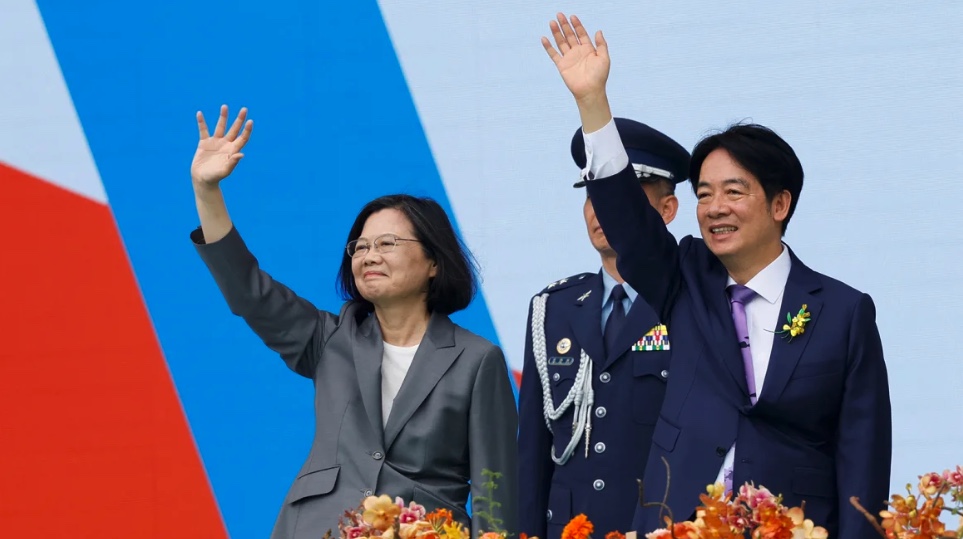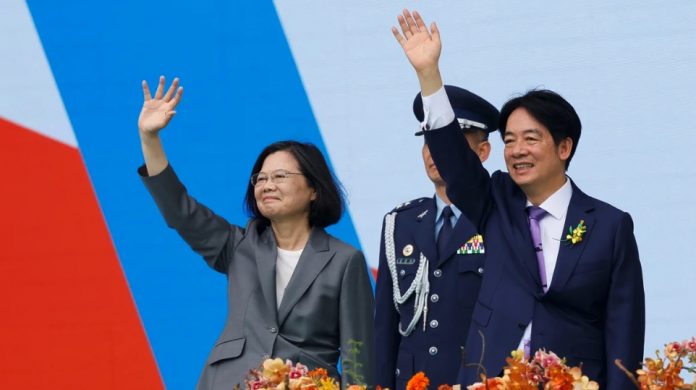ไล่ ชิงเต๋อ เข้าพิธีสาบานตนเข้ารับตำแหน่งประธานาธิบดีไต้หวันเมื่อวันจันทร์ ถือเป็นการเริ่มต้นประวัติศาสตร์สมัยที่ 3 ติดต่อกันของพรรคประชาธิปไตยก้าวหน้า (DPP) ที่ปกครองอยู่ ไล่ วัย 64 ปี เข้าพิธีสาบานตนเข้ารับตำแหน่งร่วมกับรองประธานาธิบดีเซียว บีคิม อดีตทูตระดับสูงของไต้หวันประจำสหรัฐฯ พรรคดีพีพีและผู้นำพรรคถูกปักกิ่งคัดค้านอย่างรุนแรงที่สนับสนุนอธิปไตยของไต้หวัน จีนอ้างสิทธิ์ไต้หวันเป็นอาณาเขตของตน และให้คำมั่นว่าจะยึดไต้หวันด้วยกำลังหากจำเป็น ไล่เข้ามารับตำแหน่งต่อจากไช่ อิงเหวิน ซึ่งช่วยส่งเสริมชื่อเสียงของไต้หวันในระดับนานาชาติระหว่างดำรงตำแหน่งแปดปี ในสุนทรพจน์เข้ารับตำแหน่ง ไล่ถูกคาดหวังให้สานต่อความสำเร็จของไช่ และส่งเสริมสันติภาพและความเจริญรุ่งเรืองทั่วช่องแคบไต้หวัน
ไล่ได้รับชัยชนะในการเลือกตั้งเดือนมกราคม โดยเอาชนะคู่แข่งจากพรรคฝ่ายค้านก๊กมินตั๋ง (KMT) และพรรคประชาชนไต้หวัน การเลือกตั้งมุ่งเน้นไปที่ประเด็นต่างๆ รวมถึงความสัมพันธ์ของไต้หวันกับจีน ซึ่งมีความกล้าแสดงออกมากขึ้นภายใต้การนำของสี จิ้นผิง แม้ว่าปักกิ่งจะเตือนถึงความขัดแย้งที่อาจเกิดขึ้น แต่ผู้ลงคะแนนเสียงก็สนับสนุนพรรคประชาธิปไตยก้าวหน้า (DPP) ซึ่งสนับสนุนอธิปไตยของไต้หวันและมีความสัมพันธ์ใกล้ชิดกับชาติประชาธิปไตยมากขึ้น ไล่ ซึ่งเป็นแกนนำที่สนับสนุนมุมมองเหล่านี้ ยกย่องชัยชนะของเขาว่าเป็น “ชัยชนะของประชาคมประชาธิปไตย” ไล่เป็นนักการเมืองผู้ช่ำชอง ครั้งหนึ่งเคยเป็นผู้สนับสนุนอย่างแข็งขันเพื่อเอกราชของไต้หวัน ซึ่งทำให้ปักกิ่งโกรธเคือง แม้ว่าจุดยืนของเขาจะเบาลง แต่จีนก็ยังไม่ให้อภัยเขาสำหรับคำพูดในอดีตของเขา
ในช่วงก่อนการเลือกตั้ง เจ้าหน้าที่จีนแสดงภาพการลงคะแนนเสียงเป็นทางเลือกระหว่าง “สันติภาพและสงคราม” โดยกล่าวหาไล่ว่ายั่วยุให้เกิดความขัดแย้ง ตอนนี้ไล่สนับสนุนสถานะที่เป็นอยู่ในปัจจุบัน โดยยืนยันว่า “ไต้หวันเป็นประเทศอธิปไตยที่เป็นอิสระอยู่แล้ว” โดยไม่จำเป็นต้องประกาศเอกราช ท่าทางนี้สะท้อนถึง ไช่ อิง เหวิน ภายใต้การนำของสี จิ้นผิง ความคิดเห็นสาธารณะของไต้หวันได้เคลื่อนตัวออกห่างจากจีนอย่างเด็ดขาด โดยมีน้อยกว่า 10% ที่สนับสนุนการรวมชาติ และน้อยกว่า 3% ที่ระบุว่าส่วนใหญ่เป็นชาวจีน ชาวไต้หวันส่วนใหญ่ชอบที่จะรักษาสภาพที่เป็นอยู่ในปัจจุบันและปฏิเสธการปกครองของปักกิ่ง ปักกิ่งเพิ่มแรงกดดันทางการฑูต เศรษฐกิจ และการทหารต่อไต้หวัน โดยมีความตึงเครียดสูงสุดนับตั้งแต่ปี 2539 การสื่อสารอย่างเป็นทางการระหว่างปักกิ่งและไทเปยังคงถูกตัดขาด เนื่องจากจีนปฏิเสธข้อเสนอของไล่สำหรับการเจรจา และตีตราเขาว่าเป็นผู้แบ่งแยกดินแดนที่เป็นอันตราย
Taiwan installs a new president for the ruling party’s historic third term after voters disregard warnings from China.

Lai Ching-te was inaugurated as Taiwan’s president on Monday, beginning a historic third consecutive term for the ruling Democratic Progressive Party (DPP). Lai, 64, was inaugurated alongside Vice President Hsiao Bi-khim, Taiwan’s former top envoy to the U.S. The DPP and its leaders are strongly opposed by Beijing for advocating Taiwan’s sovereignty. China claims Taiwan as its territory and has vowed to take it by force if necessary. Lai succeeds Tsai Ing-wen, who boosted Taiwan’s international standing during her eight-year tenure. In his inauguration speech, Lai is expected to build on Tsai’s achievements and promote peace and prosperity across the Taiwan Strait.
Lai emerged victorious in the January election, defeating rivals from the opposition Kuomintang (KMT) party and the Taiwan People’s Party. The election focused on various issues, including Taiwan’s relationship with China, which has become more assertive under Xi Jinping. Despite Beijing’s warnings about potential conflict, voters supported the Democratic Progressive Party (DPP), which advocates for Taiwan’s sovereignty and closer ties with democratic nations. Lai, a vocal supporter of these views, hailed his win as a “victory for the community of democracies.” A seasoned politician, Lai was once a strong advocate for Taiwan independence, which angered Beijing. Although his stance has softened, China has not forgiven him for his past remarks.
In the lead-up to the election, Chinese officials repeatedly portrayed the vote as a choice between “peace and war,” accusing Lai of provoking conflict. Lai now supports the current status quo, asserting that “Taiwan is already an independent sovereign country,” with no need to declare independence. This stance echoes his predecessor, Tsai Ing-wen. Under Xi Jinping, Taiwan’s public opinion has moved decisively away from China, with less than 10% supporting unification and less than 3% identifying primarily as Chinese. Most Taiwanese prefer maintaining the current status quo and reject Beijing’s rule. Beijing has increased diplomatic, economic, and military pressure on Taiwan, with tensions at their highest since 1996. Official communication between Beijing and Taipei remains severed, as China rejects Lai’s offers for talks and labels him a dangerous separatist.
By CNN NEWS

















